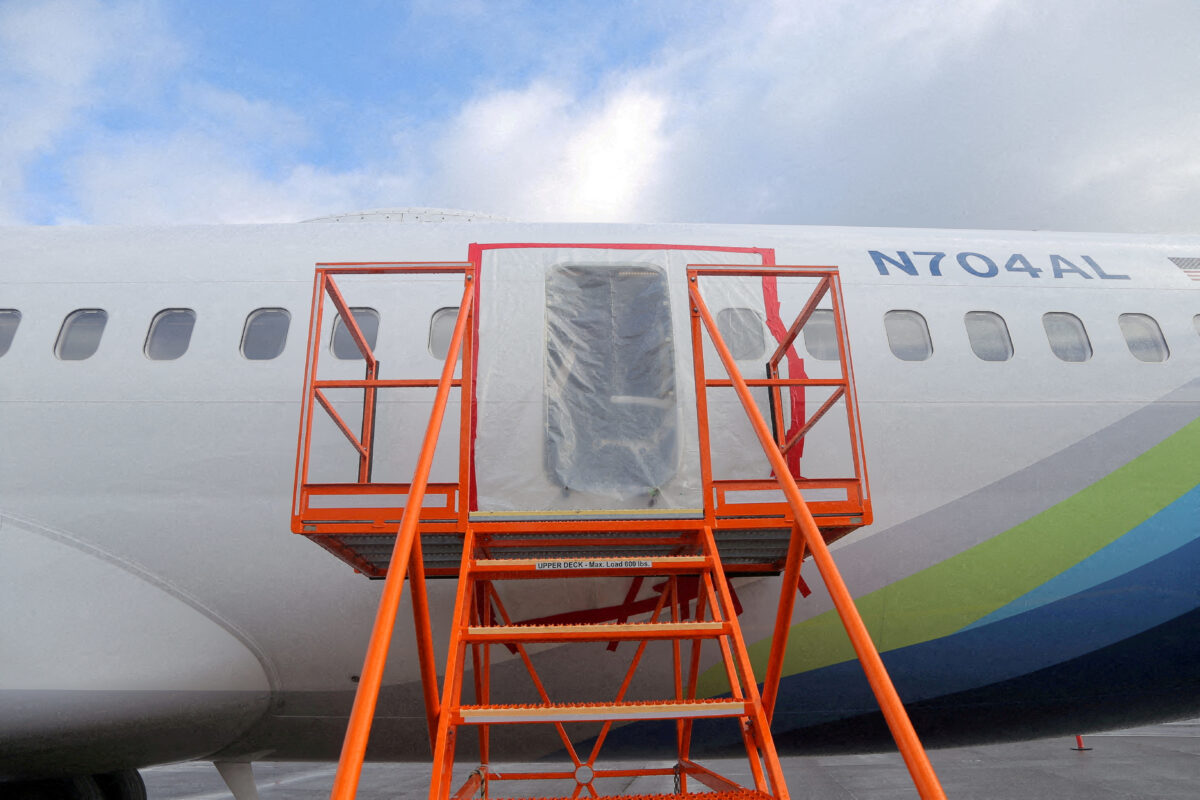Boeing under a microscope for safety issues as it reports results

FILE PHOTO: The fuselage plug area of Alaska Airlines Flight 1282 Boeing 737-9 MAX, which was forced to make an emergency landing with a gap in the fuselage, is seen during its investigation by the National Transportation Safety Board (NTSB) in Portland, Oregon, U.S. January 7, 2024. NTSB/Handout via REUTERS/File Photo
When Boeing CEO Dave Calhoun delivers the company’s fourth-quarter results on Wednesday, he will be doing it while the planemaker is in the middle of its biggest safety crisis since the two fatal 737 MAX crashes in 2018 and 2019.
The company, long a symbol of America’s manufacturing prowess, is in the crosshairs of regulators, politicians and airlines following a harrowing mid-air cabin panel blowout on a passenger-filled 737 MAX 9 jet operated by Alaska Airlines earlier this month.
Analysts say Boeing leaders will be trying to assure people that the company’s focus is on aircraft safety and production quality.
“The first thing investors should realize … is they are not the direct focus of this call,” J.P. Morgan’s Seth Seifman said, adding the primary audience is the Federal Aviation Administration, members of Congress and the traveling public.
“What is important is safety, quality, Boeing’s processes, the way that Boeing’s workforce performs, and the way that Boeing’s managers evaluate and incentivize that workforce. Those are things that I think management will really need to talk about,” he said.
Before the Alaska accident, Boeing was expected to release a new financial and delivery target for 2024 and provide an update on its forecast for 2025-2026, the timeframe in which the planemaker’s operations are expected to stabilize.
Boeing projected free cash flow of about $10 billion by 2025-2026, with 737 production expected to reach 50 per month.
All of that is in question after the FAA last Wednesday announced it would not approve further production rate increases for the 737 MAX.
“It gives even less confidence to their guidance and guarantees. A flat year at best,” Richard Aboualfia of AeroDynamic Advisory said. “There are so many question marks and this is just yet another one.”
Boeing has declined to confirm its current 737 production rate, but executives said in October they expected it to reach 38 per month by the end of 2023. In a Jan. 22 email seen by Reuters it told suppliers to adhere to the master schedule that calls for an increase to 42 a month in February.
“Expect more volatility”
Boeing shares have fallen 21% in January, putting them on track for their worst January since at least 2017. They rose about 39% in 2023 on optimism that the aerospace giant was on track to being profitable again, despite nagging quality issues.
“While we think that many U.S. investors have the ‘muscle memory’ that inclines them to buy Boeing here, we would be wary of further volatility in the share price,” Vertical Research Partners’ Robert Stallard wrote in a note last week.
He recommended Airbus shares as one of the ways to better gain exposure to the aerospace boom.
But airlines and investors expect Boeing to recover from its most recent crisis and come out as a stronger company.
“I’m fully confident in Boeing’s long-term prospects,” said Tony Bancroft of Gabelli Funds, whose Gabelli Commercial Aerospace & Defense ETF invests at least 80% in common stocks of aerospace and defense companies, including Boeing.
Analysts polled by LSEG expect Boeing to report a narrower fourth-quarter adjusted loss of $481.24 million, on revenue of $21.08 billion. For 2024, analysts expect a profit of $2.66 billion, on revenue of about $89.52 billion and free cash flow of $5.68 billion.

